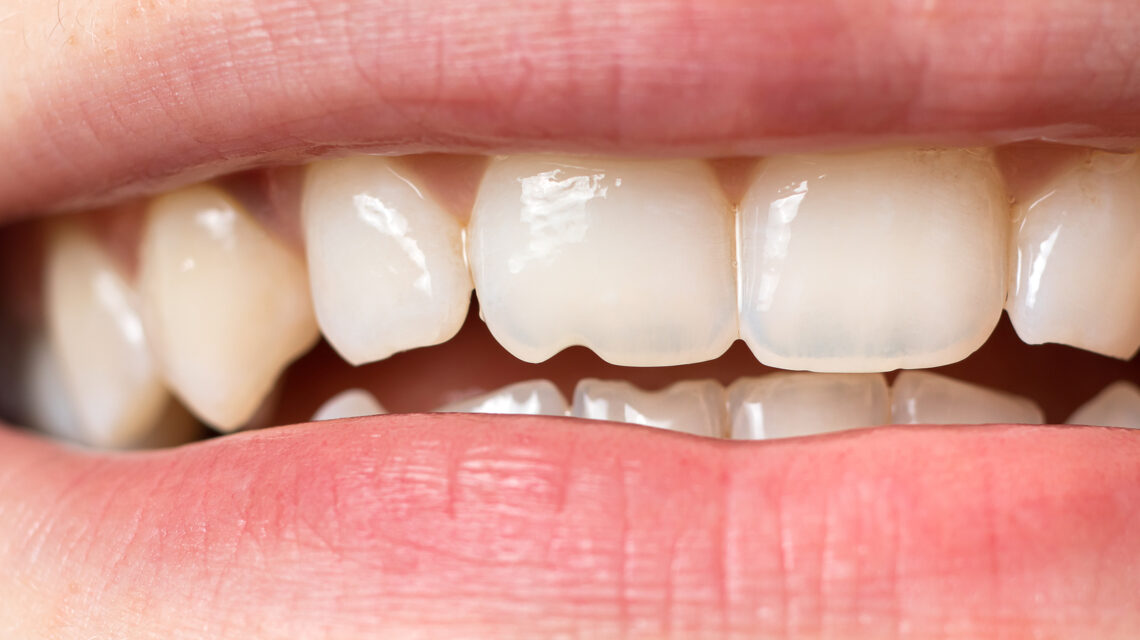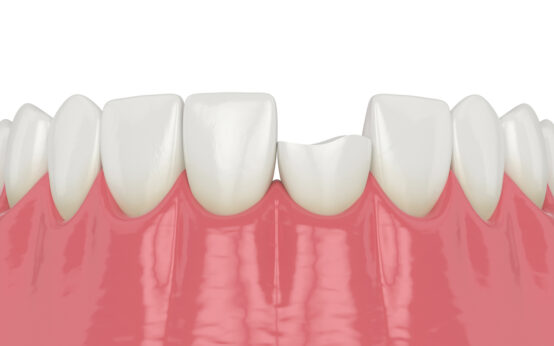If you have a chipped tooth, you may be wondering if you should seek medical attention. While a minor chip might seem harmless, a broken tooth or infection can result in severe consequences. You should visit a dentist right away to have it repaired, as a chipped tooth can lead to other dental problems, as well. Read on to learn more about chipped teeth and what to do in the event of one. Also, learn how to prevent chipped teeth and get the treatment you need.
Table of Contents
Symptoms
The crack usually starts near the gum line and spreads to the chewing surface. The fracture line may be visible, but only under a microscope. A dental professional must find this line to determine whether the tooth is cracked. A chipped tooth is a broken tooth that has a small or large piece knocked out of it. The chip may have been knocked out by a fall, sports injury, or trauma to the mouth. Chipped teeth require urgent care to prevent further damage.
Symptoms of chipped teeth include sensitivity and pain when chewing. If the chip has exposed the nerve in the tooth, the pain may be intense. Pain may also be localized and worsen with heat or cold. Seeing a dentist for treatment immediately is recommended. Even if the pain is mild, it can worsen if the tooth is exposed to bacteria in the mouth. Consequently, a chipped tooth may result in infection.
Many factors contribute to the formation of chipped teeth, including poor nutrition, excessive use of sugary and acidic foods, and grinding teeth. Besides the above, chipped teeth can be caused by trauma to the face and chewing hard foods or candy. Chipped teeth must be treated immediately, otherwise, they may become structurally compromised and require a major dental procedure. While tooth enamel is the most important part of your body, it is prone to erosion.
Treatment options
If you have a chipped tooth, you should schedule an appointment as soon as possible. During your appointment, your cosmetic dentist can examine your chipped tooth and determine the most appropriate treatment. Chipped teeth may be a temporary or permanent problem, depending on your specific condition. A visit to your dentist may also be necessary if you're suffering from a dental infection. These infections spread through blood vessels and need to be treated by a dental professional.
After visiting your dentist, you may want to consider over-the-counter pain relievers and ice packs. A saltwater rinse may help reduce swelling, although aspirin is a strong astringent and can cause further bleeding. If you're not in pain, you may want to take sugarless chewing gum or wax paraffin to protect the tooth's jagged edges. If you're unable to avoid eating soft foods, you may wish to consider filling the chip with a dental composite resin. These materials are molded to look like the natural tooth, so they can preserve your tooth's appearance and prevent further damage.
If the chipped tooth is minor, it may only require a simple polishing or cleaning. Afterward, the dentist can discuss other treatment options with you. The most common treatment for chipped teeth is dental bonding, which is a cosmetic procedure that involves molding a tooth-colored filling material to the desired shape and finish. It's important to note that tooth-colored composite resin is not a permanent solution, so the dentist should recommend it only after evaluating the condition of your tooth.
Preventing a chipped tooth
There are several ways to prevent chipped teeth, depending on the severity of the chip. A minor chip can be treated with a dental filling or a dermal filling, while a moderate chip may require a crown or root canal. In severe cases, a tooth may be extracted. Fortunately, chipped teeth can often be avoided if you practice good oral hygiene. Regular dental checkups will prevent dental decay and chipped teeth.
To prevent chipped teeth, avoid using your mouth as a tool. Avoid chewing on inedible objects, such as your fingernails or gaps in pens. And be careful with hard foods, such as seeds, nuts, and chips. Even small chips can leave a portion of the crown of your tooth exposed. For this reason, it is critical to visit a dental office as soon as possible.
One of the best ways to prevent chipped teeth is to wear a mouthguard. It will protect your teeth against the hard impact of everyday life. Even though tooth enamel is the strongest material in our bodies, it is still easily chipped or damaged. Consequently, tooth chips are a sign of dental decay or root canal infection. You should visit a dentist immediately if you have chipped a tooth. A dental visit will ensure that you don't need a root canal or extraction.
Root canal treatment
If you've cracked or chipped a tooth, you may need root canal treatment. Cracked teeth may be repairable with bonding material, crowns, or some other method. However, if the damage has reached the pulp, you might need a root canal to prevent further problems. Cracked teeth include craze lines, split teeth, and fractured cusps. Your dentist will decide what treatment is best for your situation, based on the type of crack.
The procedure begins with numbing the area around the damaged tooth. Your dentist may use an x-ray to guide the procedure. The dentist will then use a chemical solution to clean the interior of the tooth and access the pulp chamber. Tiny instruments will be used to remove the nerve from the tooth. Once the nerve has been removed, your dentist will seal the tooth and apply a temporary filling to protect it while it heals.
Patients may experience discomfort for a few days after undergoing root canal therapy. Antibiotics and prescription-strength pain relievers can be prescribed by your dentist to alleviate any discomfort associated with the procedure. After the procedure, you should refrain from chewing on the tooth until you receive its final restoration. The longer you delay the final restoration, the more likely it will be re-infected. So, if you think you've cracked or chipped a tooth, see a dentist right away.
Veneers
Porcelain veneers can mask a wide variety of cosmetic dental problems, including chips and cracks. Tooth grinding, an uneven bite, or the consumption of sugary or acidic foods can cause the damage that needs to be corrected. The procedure is a simple and painless way to improve your smile. You can choose the type of veneer that will best improve your appearance. To learn more about the benefits of veneers, contact Paxton Dental Care.
Before undergoing the procedure, your dentist will prepare the teeth. First, your dentist will remove 0.3mm to 1.2mm of the enamel. This thin layer will be replaced with a porcelain veneer. This procedure will usually take two or three visits to complete. During the first visit, you will be fitted with a temporary set of veneers. At your second and third visits, a ceramist will make a custom set of veneers.
In addition to ensuring that your new veneers are durable, you should practice good dental hygiene to protect them from damage. Chewing hard objects or using your teeth for other purposes such as opening packages can damage your new veneers. Similarly, grinding your teeth can lead to advanced wear and tear of your veneers, and may require a replacement. If you are planning to get veneers for chipped teeth, you must consider the following tips to maintain them properly.
Total tooth extraction
To avoid the risk of infection, your dentist may recommend total tooth extraction for chipped teeth. This procedure is not painless and can cause swelling and tenderness in the surrounding area. It also requires more recovery time, since the wound can become infected. Depending on the type of extraction, you may have several follow-up appointments to remove the stitches and monitor healing. The pain after a total tooth extraction is expected to be minimal, but it may last for a few days.
In some cases, total tooth extraction is necessary if there is a risk of infection, either through genetics or other diseases. For example, in patients undergoing chemotherapy, an untreated chipped or cracked tooth is an open invitation to a potential infection. A missing tooth can also lead to shifting of the remaining teeth, loss of bone, and changes in facial appearance. In addition, missing teeth can affect a person's ability to chew food properly and negatively affect their self-confidence.
Total tooth extraction can take anywhere from five to thirty minutes. The dentist will place gauze in the socket to reduce the amount of bleeding. If necessary, a dentist may use stitches to close the gum tissue. Typically, self-dissolving stitches are used, but if you'd like a permanent closure, your dentist may choose to use a temporary one. If the temporary one doesn't work, your dentist can use a surgical suture instead.
Sources:
- https://www.webmd.com/oral-health/guide/veneers-and-chipped-teeth#1
- https://www.colgate.com/en-us/oral-health/cosmetic-dentistry/veneers/what-are-veneers-and-how-can-they-improve-my-smile–
- https://www.mayoclinic.org/tests-procedures/dental-veneers/about/pac-20385155
- https://www.healthline.com/health/dental-and-oral-health/veneers#risks-and-compl



 Dental Implants and Bonding As Treatments For Chipped Teeth
Dental Implants and Bonding As Treatments For Chipped Teeth